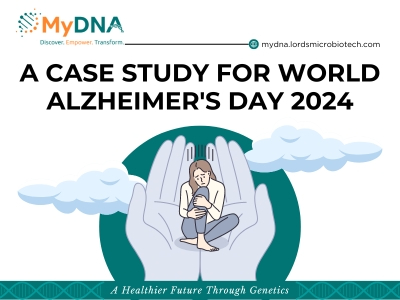
September 21st marks World Alzheimer’s Day, a global opportunity to raise awareness about Alzheimer’s disease, the most common cause of dementia worldwide. On this day, we honor those affected and shed light on how genetics can play a role in the development of the disease. Today, we’ll explore the case of Pooja, a 68-year-old woman navigating the challenges of Alzheimer’s, with a focus on the genetic factors that might influence the condition.
Pooja is a 68-year-old retired schoolteacher. Over the past two years, her family has noticed worrying changes in her behavior. Once an organized and vibrant individual, she now struggles with simple tasks like managing her finances and remembering appointments. More recently, she has been getting lost in familiar places and repeating the same questions in conversations. Her children have been concerned by these symptoms and decided it was time to get help. When they sat down with her doctor, it became clear that she was showing early signs of Alzheimer’s Disease (AD). What worried the family even more was their knowledge of Pooja’s father’s battle with Alzheimer’s, which began in his early 70s. Two of her paternal aunts also showed signs of cognitive decline, raising red flags about a possible genetic connection.
What is Alzheimer’s Disease? Let us understand the basics.
Alzheimer’s disease is a neurodegenerative condition that leads to progressive memory loss, confusion, and changes in behavior. It’s the leading cause of dementia and affects millions of people worldwide. While there is no cure for Alzheimer’s, early diagnosis can help manage symptoms and plan for future care.
There are two primary forms of Alzheimer’s disease:
- Early-onset Alzheimer’s Disease (EOAD): Occurs before age 65 and is often linked to specific genetic mutations.
- Late-onset Alzheimer’s Disease (LOAD): Typically occurs after age 65 and is influenced by both genetics and environmental factors.
Her case aligns with Late-Onset Alzheimer’s Disease (LOAD), given her age and the gradual development of her symptoms.
Could Genetics Be at Play?
With her family history of Alzheimer’s, Pooja’s children wanted to know more about the role genetics could play in their mother’s condition—and their own potential risk.
One of the most well-studied genes related to Alzheimer’s is APOE, specifically the APOE ε4 allele. Carrying one or two copies of the APOE ε4 variant significantly increases the risk of developing Alzheimer’s disease, however, it’s important to note that not everyone with this allele develops the condition, and many who don’t carry it may still be affected.
In Pooja’s case, her family history suggests a possible genetic predisposition to Alzheimer’s, particularly linked to the APOE gene. However, other genetic factors—along with lifestyle and environmental influences—can also play a role.
What Genetic Testing Can Tell Us?
Pooja’s children, understandably worried about their own future risk of developing Alzheimer’s, are exploring the option of genetic testing. Genetic testing for Alzheimer’s Disease can provide some insight into a person’s risk, but it’s important to remember that genetics isn’t destiny. For Pooja, testing could confirm if she carries the APOE ε4 variant, helping her family understand more about the genetic component of her condition.
Testing might also be useful for her children, but there are critical considerations before pursuing predictive genetic testing:
- Ethical concerns: Would knowing their genetic risk affect their life choices or create anxiety?
- Psychological impact: How would they cope with the knowledge that they may be at higher risk of developing Alzheimer’s?
- No certainty: Even if they carry the APOE ε4 allele, it doesn’t mean they will develop Alzheimer’s. Similarly, some without the allele still get the disease.
While the test can give useful insights, it can’t provide definitive answers. THIS IS WHY WE EMPHASIZE THE IMPORTANCE OF A PRE-TEST GENETIC COUNSELLING SESSION.
How to Reduce Alzheimer’s Risk: It's Not Just About Genes
While genetics plays a role in Alzheimer’s disease, especially in families like Pooja’s, there are lifestyle factors that can influence the risk:
- Exercise: Regular physical activity, especially aerobic exercise, has been shown to benefit brain health.
- Diet: A heart-healthy diet, such as the Mediterranean diet, can also help protect the brain.
- Mental engagement: Keeping the brain active through learning new skills, reading, and socializing can promote cognitive health.
- Managing cardiovascular health: Conditions like hypertension, diabetes, and high cholesterol can increase Alzheimer’s risk, so managing these is key.
For Pooja’s children and others worried about Alzheimer’s, incorporating these healthy habits could help reduce their risk—whether or not they carry the APOE ε4 allele.
Finally, to conclude, for many families, genetics may offer clues, but it’s only part of the picture. Raising awareness about Alzheimer’s, the importance of early diagnosis, and the role of genetic and lifestyle factors can help families make informed decisions about their health.
If you’re concerned about Alzheimer’s in your family, consider speaking to a genetic counselor. They can guide you through testing options, help you understand your risk, and suggest ways to reduce it.
Remember: While Alzheimer’s can’t yet be cured, understanding its genetic and lifestyle components empowers us to take proactive steps for brain health.